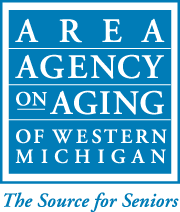Caregiver's Corner: Understanding Options to Maintain Independence

By: Stephanie Hecksel, LMSW
Outreach Specialist with the Area Agency on Aging of Western Michigan
One of the greatest fears people have as they age is the loss of independence. In fact, many people assume that eventually their independence will be lost and they will end up in long term care. Unfortunately, as a result, many people do not seek help until they are in a crisis. This does not have to happen. Needing assistance does not mean losing independence. There are a number of resources and services available to help older adults age in place.
For older adults and caregivers alike, knowing what resources are available and getting connected to support early can help individuals maintain independence and dignity as they age. The following provides a brief explanation of the resources individuals may pursue to help them remain in their homes.
Private Duty Home Care: This is care that is typically provided by an agency. Common types of private duty care services are personal care, homemaking, meal preparation, and medication reminders. Agencies may vary in the amount of care that can be offered as well as how much their hourly rates are. Some agencies may accept insurance, such as Medicare or Medicare Advantage plans. Insurance has specific criteria that a person must meet in order to receive care covered by their plan; this is typically referred to as “skilled home health care” and is generally meant to provide short-term rehabilitative services. It is usually up to the individual to cover the cost of any day-to-day “nonskilled” care. It is a good idea for people to talk to an agency about the potential cost they may face.
For those who cannot afford private duty care, there may be other options available. Several programs are available to lower-income individuals to help them age in place. The services offered help meet the needs of individuals in their homes and also provide some relief for their caregivers who may feel overwhelmed and strained while trying to help their loved ones. There are criteria that must be met for eligibility and sometimes there is a waiting list for services, which is why it is important to plan ahead. After an initial screening, an individual would assess to determine the services they need. Below is a review of the programs and services available to older adults.
Care Management: A Care Management team comprised of a social worker and nurse coordinates the care an older adult might require to remain independent. Care managers would set up services for personal care (i.e. bathing), homemaking (i.e vacuuming, laundry, other light housework), and/or respite to individuals age 60 and up who live in an independent setting and need some assistance meeting their ongoing needs.
MI Choice Medicaid Waiver: MI Choice Medicaid Waiver is a long-term care program designed to be an alternative to nursing home placement. The first step to enrolling for this program is to do a prescreen interview over the phone with available financial information. Once eligibility to confirmed, an in-person assessment is conducted with a registered nurse and licensed social worker. This team and the individual will develop a person-centered service plan and services will be coordinated to ensure an individual’s needs will be met in the setting (s)he chooses on an ongoing basis.
PACE: PACE is an all-inclusive program geared toward individuals who again may otherwise qualify to reside in a nursing home setting. Once enrolled in the program, individuals will benefit from PACE being the provider for all of the things they may need: primary care, dental, vision, podiatry, pharmacy, adult day center, and transportation.
Adult Day Health: Centers are offered in some areas and can have a medical focus, social focus, or both. Individuals can go to the center where the staff may offer some personal care as well as meals and social activities. This can be an option for someone who cannot be left alone because of safety risks but may not have a caregiver that can be present with them at home.
Adult Home Help: helps to meet the personal care needs as well as homemaking needs of an individual who meets criteria per the Michigan Department of Health and Human Services (MDHHS). There are income guidelines and the person must be eligible for Medicaid in order to be considered for this program. Often times, a person may have a paid caregiver in place to assist with ongoing needs.
To learn more about these programs, plan to attend our next Family Caregiver University class on Thursday, September 26, 2019, 1:00 – 3:00 p.m. In our class, “Understanding Options to Maintain Independence” we will have experts from different fields available to explain programs more in depth and to have your questions answered.
For a full list of Family Caregiver University classes provided by the Caregiver Resource Network, please call (888) 456-5664 or visit www.caregiverresource.net.
Caregiver’s Corner is provided as a public service of the Caregiver Resource Network. The Caregiver Resource Network is a collaboration of West Michigan organizations dedicated to providing for the needs and welfare of family and professional caregivers within the community. Funded by the Area Agency on Aging of Western Michigan with Older American’s Act Title IIIE, Family Caregiver Support funds.
Tagged:

